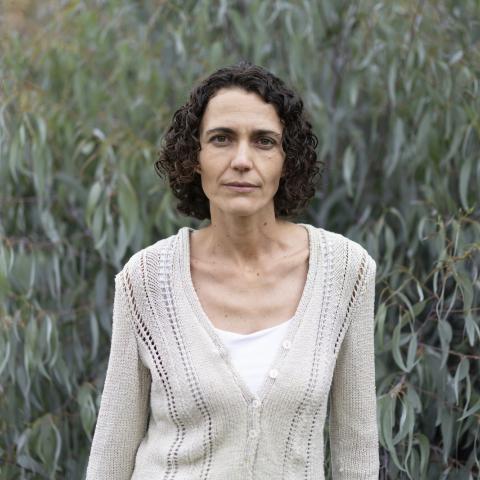Career story
All over the world, bushfires are getting bigger, more intense and more frequent. Earth observation scientists like Marta Yebra are using satellite imagery to try and reduce their impact.
Associate Professor Marta Yebra is an Earth observation mission specialist at The Australian National University’s Institute for Space (or ANU InSpace). She is also the Director of Bushfire Research Centre of Excellence at ANU. This program aims to develop technology that will help prevent catastrophic bushfires. The goal is to detect small bushfires as soon as they ignite and put them out before they grow and become uncontrolled.
Using space technology to help prevent bushfires
A big part of Marta’s work is InSpace’s OzFuel program. OzFuel’s goal is to create space sensor systems that are specifically designed to monitor vegetation fuel hazards and prevent bushfires. These will be attached to microsatellites and launched into low Earth orbit (around 500-600 kilometres from the Earth’s surface). The imagery sent back will help researchers track how dry it is in the bush and how much fuel is building up. There is also potential scope to detect fires that have already started.
“You might think that a geostationary satellite that is looking across Australia all the time would be enough,” Marta says. “But the ground resolution of the sensors on board those satellites is too big to detect a small fire.
“Current satellites in low Earth orbit have better ground resolution, but they don’t pass over Australia as frequently. You need to be very lucky to pick up a small fire as soon as it ignites.”
In her research, Marta uses a combination of imagery from remote sensors on satellites, drones and on the ground. She says that Australia needs satellite technology that is purpose-built for bushfire prevention and detection. “Currently, Australian scientists use whatever data we can get from international missions that were developed for other purposes. Our objective with OzFuel is to build our own satellite and collect our own data.”
From dentistry to satellite data
Originally from Spain, Marta studied ballet and nearly studied dentistry after finishing high school. Instead, she took a year off to think about her options.
“I realised that I didn’t want to be inside all day, looking inside people’s mouths,” she says.
“I’m a very outdoor person. I’m inspired by nature, so I decided to do something to preserve the environment.”
Marta completed a Bachelor of Environmental Sciences at the University of Alcala in Spain. In her final year she volunteered on a field study at a national park, collecting information about potential fire risks. She found the experience so inspiring that she went on to do a PhD focusing on estimating fire risk using satellite data.
During her PhD, Marta travelled to California, Argentina and the UK to research bushfire mitigation worldwide. She also spent four months at CSIRO in Canberra and loved it so much she came back after graduating. Marta spent three years as a postdoctoral fellow at CSIRO before moving over to ANU.
Marta hopes that the remote sensors she and her team are developing for OzFuel will help prevent catastrophic fires in the future.
“Any little improvement in bushfire prevention can have a huge impact. Making something that might help prevent bushfire season is a huge motivation for me."
Career journey
2003
Marta completed a Bachelor of Environmental Sciences at the University of Alcala in Spain in 2003.
2008
She then completed a PhD on the use of satellite imagery in bushfire prevention in 2008.
2008
For the next few years, Marta worked as a researcher at the University of Alcala.
2010
She then moved to Canberra in 2010 to take up a postdoc position with CSIRO.
2014
Marta joined the ANU as a Senior Scientist to lead a project for the Bushfire and Natural Hazards CRC on Mapping Bushfire Hazards and Impact.
2017
Marta received the prestigious Max Day Environmental Science Fellowship from the Australian Academy of Science.
Present
She is now an Associate Professor in Environment and Engineering as well as the University's Director, Bushfire Research Centre of Excellence,

